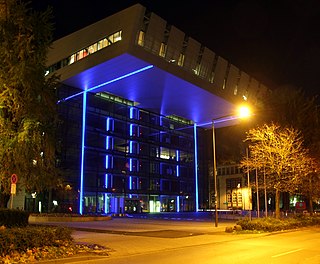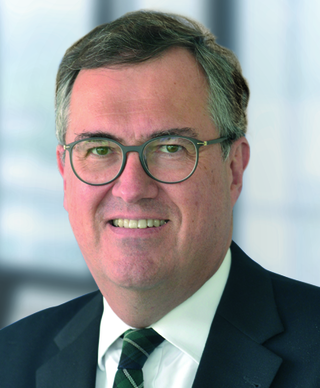Related Research Articles

RWTH Aachen University, also known as North Rhine-Westphalia Technical University of Aachen, Rhine-Westphalia Technical University of Aachen, Technical University of Aachen, University of Aachen, or Rheinisch-Westfälische Technische Hochschule Aachen, is a German public research university located in Aachen, North Rhine-Westphalia, Germany. With more than 47,000 students enrolled in 144 study programs, it is the largest technical university in Germany. In 2018, the university was ranked 31st in the world university rankings in the field of engineering and technology, and 36th world-wide in the category of natural sciences.
Peter Pin-Shan Chen is a Taiwanese American computer scientist. He is a (retired) distinguished career scientist and faculty member at Carnegie Mellon University and Distinguished Chair Professor Emeritus at LSU. He is known for the development of the entity–relationship model in 1976.
The Gottfried Wilhelm Leibniz Prize, in short Leibniz Prize, is awarded by the German Research Foundation to "exceptional scientists and academics for their outstanding achievements in the field of research". Since 1986, up to ten prizes are awarded annually to individuals or research groups working at a research institution in Germany or at a German research institution abroad. It is considered the most important research award in Germany.

The Clausthal University of Technology is an institute of technology in Clausthal-Zellerfeld, Lower Saxony, Germany. The small public university is regularly ranked among the Top German universities in engineering by CHE University Rankings. More than 30 % of students and 20 % of academic staff come from abroad, making it one of the most international universities in Germany. The university is best known for the prominent corporate leaders among its former students. In 2011, five of the 30 leading companies within the German stock index had alumni of TUC on their management board. Two of them as CEO.
The Faculty of Mechanical Engineering is one of the nine faculties at the RWTH Aachen University and is widely recognized as one of the foremosts of such a faculty in Europe and the world. It was established in 1880 and has produced several notable individuals including Wendelin Wiedeking, Hugo Junkers, and Jesco von Puttkamer. Theodore von Kármán, a pioneer of modern Aerodynamics, accepted a position as director of the Aeronautical Institute in 1912. Several projects are assisted by the Deutsche Forschungsgemeinschaft and the European Union. Approximately 7,100 students are enrolled in the faculty. The faculty received a high amount of funds granted by third-party donors in the last years.

Juraj Hromkovič is a Slovak Computer Scientist and Professor at ETH Zürich. He is the author of numerous monographs and scientific publications in the field of algorithmics, computational complexity theory, and randomization.

TU9 German Universities of Technology e. V. is the alliance of nine leading Technical Universities in Germany. The current president of TU9 is Wolfram Ressel, rector of the University of Stuttgart.

Werner E. Reichardt was a German physicist and biologist who helped to establish the field of biological cybernetics. He co-founded the Max Planck Institute for Biological Cybernetics, and the Journal of Biological Cybernetics.

Detlef Zuehlke is a German engineer and professor.

Sabina Jeschke is a German university professor for information sciences in mechanical engineering at the RWTH Aachen University. As of 10 November 2017, she was named member of the management board of Deutschen Bahn AG for digitalization and technology. She is also the director of the Cybernetics Lab IMA/ZLW & IfU. In the summer semester of 2017, she is on sabbatical leave to develop her research in the area of artificial consciousness, and is involved in building a think tank "Strong Artificial Intelligence" at the Volvo Car Corporation in Göteborg. Since May 2015, Jeschke has been a member of the supervisory board of Körber AG, since April 2012 chairman of the board of VDI Aachen

Matthias Jarke is a German computer scientist.
Bernhard Rumpe is a German computer scientist, professor of computer science and head of the Software Engineering Department at the RWTH Aachen University. His research focusses on "technologies, methods, tools ... necessary to create software in the necessary quality that is as efficient and sustainable as possible."
Gunnar Johannsen is a German cyberneticist, and Emeritus Professor of Systems Engineering and Human-Machine Systems at the University of Kassel, known for his contributions in the field of human-machine systems.
Klaus Pohl is a German computer scientist and Professor for Software Systems Engineering at the University of Duisburg-Essen, mainly known for his work in Requirements Engineering and Software product line engineering.
Ludwig Staiger is a German mathematician and computer scientist at the Martin Luther University of Halle-Wittenberg.
Bernd Georg Lottermoser is university professor with expertise in the sustainable extraction of mineral resources.
The OSTO System Model is based on the OSTO System Theory, which comprehends complex systems and organizations as living systems and maps these by means of the OSTO System Model. The model is cybernetic in nature and is deduced from the theory of closed loops. The basics of this theory have been formulated by David P. Hanna in the 1980s and have been published initially in 1988. The model assumes that several central transformation processes take place on the inside of a complex organization. These are deeply influenced by mutual reactions between the inner life of the organization and the outside (environment). In terms of closed loop theory, the OSTO System Model depicts the essential elements of such a living system in its interconnectedness, dependencies, and reciprocal reactions. Thinking in network structures is, thus, a crucial part of the OSTO System Theory.
Dieter Henning was a German engineer and chairman of the board of management of Rheinbraun AG from 1993 to 1999.

Johann Wolfgang Koch is a German physicist and computer scientist. He teaches applied computer science at the University of Bonn, Germany, and is chief scientist of the Fraunhofer Institute for Communication, Information Processing and Ergonomics. In 2011, Koch was elected a IEEE Fellow and since 2015, he has been an IEEE Distinguished Lecturer

The Institut für Kunststoffverarbeitung in Industrie und Handwerk (IKV), the Institute for Plastics Processing in Industry and Trade at the Rheinisch-Westfälische Technische Hochschule Aachen, Germany, is a teaching and research institute for the study of plastics technology. It stands for practice-oriented research, innovation and technology transfer. The focus of the IKV is the integrative view of product development in the material, construction and processing sectors, in particular in plastics and rubber. The sponsor is a non-profit association that currently includes around 300 companies from the plastics industry worldwide and through which the institute maintains a close connection between industry and science. In addition, the IKV is a member of the Arbeitsgemeinschaft industrieller Forschungsvereinigungen "Otto von Guericke" (AiF).
References
- ↑ https://www.ifu.rwth-aachen.de/en/ Institute for Management Cybernetics